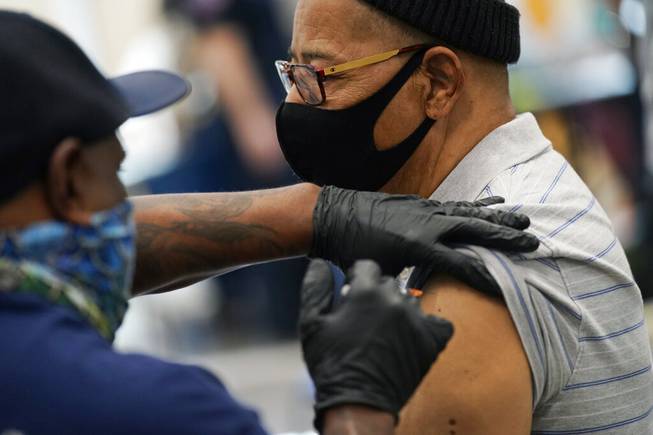
John Locher / AP
Wayne Pollard receives a COVID-19 vaccine at the Martin Luther King Senior Center, Wednesday, Feb. 10, 2021, in North Las Vegas. The “pop-up” clinic was held to serve under-vaccinated areas in Las Vegas.
Sunday, Feb. 28, 2021 | 2 a.m.
View more of the Sun's opinion section
Southern Nevada is mobilizing to address ethnic disparity in local distributions of COVID-19 vaccinations. Thanks to health officials and local government staffers, plus cooperation from the private sector, Las Vegas neighborhoods with large minority populations are starting to receive the outreach, information and access to vaccines that they deserve.
We’re seeing it in North Las Vegas, where city and health officials devised a comprehensive plan to reach Black and Hispanic residents, and in places like the Rafael Rivera Community Center in east Las Vegas, the site of a vaccine clinic that began Thursday and was conducted by the Immigrant Home Foundation and Walmart. In addition, the Southern Nevada Health District has opened several pop-up vaccination sites in recent weeks.
North Las Vegas’ efforts have been especially impressive. The city’s multifaceted strategy included establishment of pop-up and walk-in vaccinations clinics, as well as a bilingual public information campaign to reach individuals in three ZIP codes with particularly large minority communities. Mobilizing city staff and temporary workers, the city recorded robocalls, distributed fliers to churches, went door-to-door through neighborhoods placing hang-tabs on doorknobs, made public service announcements, and set up vaccination pre-registry sites outside grocery stores, among other actions. North Las Vegas firefighters set up a registration outreach booth at the popular Broadacres swap meet as well.
A key part of the strategy was to assure residents that getting a vaccination is safe — an important message for minority residents who, for historically justifiable reasons involving discrimination and abuse at the hands of health care providers, are wary of the health care system. The city also is addressing concerns among Hispanic residents that receiving an immunization would subject them to scrutiny by immigration officials.
North Las Vegas City Councilman Isaac Barron, who is Hispanic, has been particularly active in spreading the word that the vaccine and the vaccination process are safe. He recorded a public service announcement that is currently playing in La Bonita grocery stores and has done significant outreach to the Hispanic community through social media and collaborations with community advocacy organizations. Other council members have stepped up as well, with one example being Councilwoman Pamela Goynes-Brown, who is Black, playing an instrumental role in establishing a pop-up clinic at the Martin Luther King Jr. Senior Center.
It’s an all-hands-on-deck approach, and it’s working. Vaccinations have increased significantly in all three ZIP codes, including a whopping 154% in 89030.
Efforts like this come as a significant relief, because Clark County suffered alarming ethnic disparities in the early goings of the vaccination rollout.
As of mid-February, Blacks had received just 5% of the doses despite making up 12% of the overall population, and Hispanics had received just under 11% despite comprising 32% of the population.
That was especially disturbing given that the pandemic has hit minorities especially hard. The disparity in Clark County has improved slightly since then, but there’s a long way to go to reach equity in the vaccination process.
This isn’t simply about being fair, it’s about protecting the entire community. COVID-19 doesn’t recognize ZIP code boundaries — it spreads when infected people leave home for work, shopping, etc. Plus, many of the residents in Southern Nevada’s particularly hard-hit areas work frontline jobs that can’t be done remotely, putting them at heightened risk of transmission.
From a public health standpoint, it’s critical to give these communities an appropriate share of vaccinations.
Fortunately, officials have recognized the situation as an emergency and have swung into action. We applaud them, and urge them to keep working diligently. It’s the right thing to do, not only for the neighborhoods that have been short-changed but for everyone in the valley.
